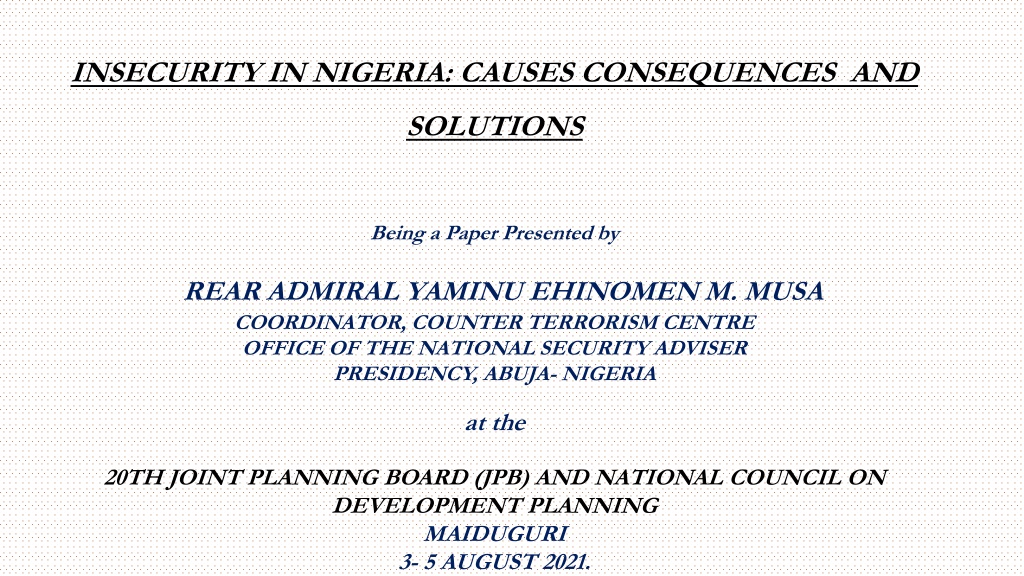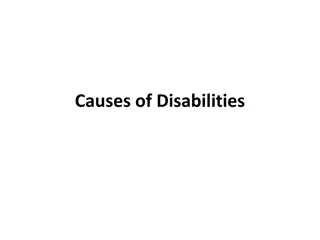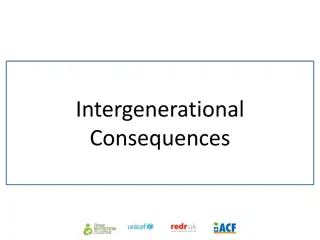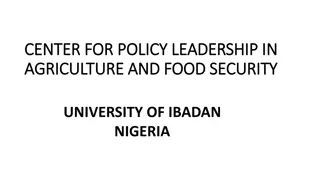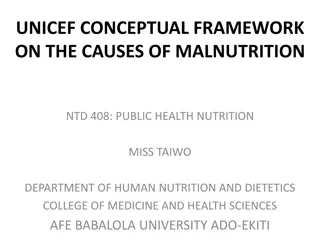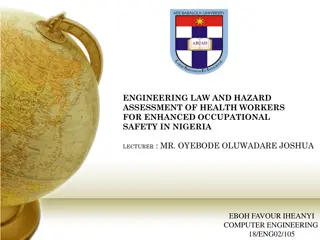Addressing Insecurity in Nigeria: Causes, Consequences, and Solutions
National security in Nigeria is crucial for economic and social development. The government is facing multifaceted insecurities across the country, requiring a whole-of-government and whole-of-society approach. Insecurity threats include terrorism, armed banditry, clashes, and organized crimes. A coordinated effort is needed to ensure peace, prosperity, and national unity.
Download Presentation

Please find below an Image/Link to download the presentation.
The content on the website is provided AS IS for your information and personal use only. It may not be sold, licensed, or shared on other websites without obtaining consent from the author. Download presentation by click this link. If you encounter any issues during the download, it is possible that the publisher has removed the file from their server.
E N D
Presentation Transcript
INSECURITY IN NIGERIA: CAUSES CONSEQUENCES AND SOLUTIONS Being a Paper Presented by REAR ADMIRAL YAMINU EHINOMEN M. MUSA COORDINATOR, COUNTER TERRORISM CENTRE OFFICE OF THE NATIONAL SECURITY ADVISER PRESIDENCY, ABUJA- NIGERIA at the 20TH JOINT PLANNING BOARD (JPB) AND NATIONAL COUNCIL ON DEVELOPMENT PLANNING MAIDUGURI 3- 5 AUGUST 2021.
INTRODUCTION National security is a precondition for economic and social development as much as economic and social development is a precondition for national security. The attainment of a peaceful and secure environment is a precursor to economic growth and development as investors and entrepreneurs require an enabling environment to reap returns on their investments. In the wake of globalization and the revolution in communication, technology and commerce, boundaries are becoming indiscernible and new security-related threats have emerged that tend to defy national boundaries. With boundaries becoming invisible because of the world becoming a global village, majority of the world s population find themselves in extreme and vulnerable circumstances with new kinds of wars being waged in every country; all of which demonstrate the fact that states no longer hold the monopoly over security issues.
INTRODUCTION The present Government, since inception, has preoccupied itself with addressing the prevailing multifaceted forms of insecurity in all parts of the country, particularly in the North East and North West regions. The increased drumbeats for secession in the South East and recently in the South West and the menace of kidnapping are illustrations of how threats from within the country can affect the well-being of Nigerians. Furthermore, in the globalized world of today, distant security threats and challenges may reach us with dramatic speed, preventing and managing them often requires action to be taken far away from our borders. The COVID-19 Pandemic and effects of climate change are instances how non-violent threats constitute great risks to a nation state requiring greater expansion of how security is perceived. The security of Nigeria is linked to the intricate and often unpredictable processes unfolding in the international security environment.
INTRODUCTION Nigeria s National Security Strategy (NSS) outlines our Mission as to apply all elements of national power to ensure physical security and human, a just society, peaceful co-existence, national unity, prosperity, sustainable development while promoting Nigeria s influence in regional, continental and global affairs . This means that every Ministry, Department and Agency (MDAs) has a stake in ensuring national security and peaceful co-existence. This can only be achieved through a whole-of-government and whole-of-society approach.
CAUSES OF INSECURITY IN NIGERIA National Security Strategy 2019, outlines Nigeria s security challenges under the following security threats: terrorism and extremism, armed banditry and militia group activities, farmers-pastoralists clashes and transnational organized crimes. Others are border security, cyber and technology challenges, socio-political developments, environmental challenges and threats, economic challenges and threats, as well as regional and global challenges. However, this paper will focus only on terrorism/violent extremism, armed banditry, transnational organized crimes, commercial kidnapping, farmers-pastoralists clashes, maritime crimes and secessionist agitations as the current levels of violence appears to be the main indicator with which the public views insecurity in the country. The foundations of our institutional framework over time have become very weak and have provoked deterioration of state governance and democratic accountability. Therefore, other causes such as unemployment and poverty, ineffective policing and weak criminal justice system will be examined.
CAUSES OF INSECURITY IN NIGERIA TERRORISM/VIOLENT EXTREMISM The threat of terrorism orchestrated by Boko Haram continue to carry out relentless attacks on both soft and high-profile targets in the North East with an ultimate aim of creating an Islamic Caliphate. Following the death of Abubakar Shekau in May 2021, the Islamic State West Africa Province (ISWAP) has emerged as the dominant group in the region. The near defeat of the Islamic State of Iraq and Syria (ISIS) in Syria has resulted in the movement of hardened terrorists from Northern Africa across the Sahel into Nigeria to support and strengthen terrorist groups in the North East. This has the potential of undermining ongoing counterterrorism/counterinsurgency efforts to rid Nigeria of terrorists/insurgents. In light of the gravity of the situation, the threat by ISWAP is considered quite potent and continues to require a comprehensive response in collaboration with our contiguous neighbours and the international community.
CAUSES OF INSECURITY IN NIGERIA ARMED BANDITRY The criminal activities of armed bandits and militia groups is arguably second to terrorism. Their major activities include kidnapping and cattle rustling which is on the increase due to the high economic pay off in terms of ransom money. There is a correlation between armed banditry, militia groups, kidnapping and cattle rustling, in what appears to be a convergence of various illegal networks. It is pertinent to note that underlying factors such as poverty, illiteracy, unemployment and other socio- economic factors particularly in the North West Zone have continued to give way for youths to be lured into illicit activities including banditry. The Armed Forces and other security agencies are currently conducting various operation such as Operations HADARIN DAJI and EX SAHEL SANITY. Some state governments have engaged the armed bandits in a reconciliatory peace meeting with varying levels of success It is on record that some major bandit leaders have embraced the reconciliatory efforts
CAUSES OF INSECURITY IN NIGERIA ARMED BANDITRY The Armed Forces and other security agencies are currently conducting various operation such as Operations HADARIN DAJI and EX SAHEL SANITY. Some state governments have engaged the armed bandits in a reconciliatory peace meeting with varying levels of success. It is on record that some major bandit leaders have embraced the reconciliatory efforts which have led unconditional release of scores of kidnap victims. Notwithstanding, attacks still occur, an indication of the diffused nature of the problem, due to the presence of multiple bandit groups operating in the North West Region and the need to evolve an enduring political-military-economic strategy.
CAUSES OF INSECURITY IN NIGERIA COMMERCIAL KIDNAPPING The threat of kidnapping has become a widespread enterprise affecting all the 6 geo-political zones of the country. Currently, the North West, North Central and South-South Geo-political zones are the kidnapping flash points in the country. Security forces are trying their best to ensure that the situation is brought under control. One major observation with regards to the activities of kidnappers is that they use the stretch of forests to hide and carry out their murderous activities.
CAUSES OF INSECURITY IN NIGERIA FARMERS-PASTORALISTS CLASHES Farmers and herdsmen conflicts remain the most predominant resource-use conflict and a growing concern to national security.. Analysis of the situation has revealed the spread of the conflict in the North West, North Central and Southern regions, especially in Kaduna, Benue, Taraba, Adamawa, Cross-River, Niger, Kwara, Enugu, Delta and Edo States. It is worthy to note that there has been a significant reduction in reported cases of conflict between herdsmen and sedentary farmers in recent times. This notwithstanding, the conflict has demonstrated a high potential to exacerbate food crisis, particularly in rural communities where most of the conflicts are localized, with reverberating repercussions nationwide.
CAUSES OF INSECURITY IN NIGERIA MARITIME CRIMES Crude oil theft, oil pipeline vandalism, operations of Illegal oil refineries, illegal fishing, piracy and kidnapping remain the major threats to maritime security in the country. However, the menace of pipeline vandalism and operations of illegal oil refineries has witnessed a downward trend and is responsible for the Nigeria s stable crude oil and gas exports. For instance, according to the International Maritime Bureau (IMB), the number of piracy attacks in Second Quarter 2021 is the lowest since same period in 2019. The establishment of the Deep Blue Project is one of the factors responsible for the reduction. However, incidents of piracy in the Gulf of Guinea (GoG) is still a major concern in the West African Sub-region and the international community.
CAUSES OF INSECURITY IN NIGERIA INCREASING SPATE OF SECESSIONIST AGITATIONS A new development which can be explained by the democratization of countries and increased rights of expression, coupled with the explosion of communications technologies, is the increase in nationalist agitations and secessionism by groups in the country. These calls for agitation are intrinsically linked to the persistent agitation for secession by the Indigenous People of Biafra (IPOB), Pro-Oduduwa Republic group and Islamic Movement of Nigeria (IMN). The activities of these groups continue to raise security concerns in recent times. The IPOB for instance have taken arms against the State and continue to attack security forces, government institutions, democratic infrastructure as well as law abiding citizens. The activities of the Pro-Oduduwa Group and IMN are inimical to national security.
CAUSES OF INSECURITY IN NIGERIA TRANSNATIONAL ORGANIZED CRIMES. The activities of transnational criminal networks engaged in smuggling, trafficking in humans and illicit drugs, proliferation of small arms and light weapons are pronounced across Nigeria s international borders. These activities have been exacerbated by the crises in Libya, Mali, Chad, Central African Republic and Sudan amongst others and thus have also made small arms readily available and cheap for unauthorized persons in Nigeria. These illicit arms stoke up violent conflicts, armed banditry, kidnapping, cattle rustling, militancy, and the insurgency/terrorism experienced in Nigeria.
CAUSES OF INSECURITY IN NIGERIA UNEMPLOYMENT AND POVERTY Poverty and unemployment lead to economic disparity and depravity which fuel terrorism and criminality with attendant implications for national security in Nigeria. Unemployment confronts the youthful populace with devastating psychological and economic effects. Also, the severity of poverty in Nigeria when examined with indicators such as life expectancy, population per doctor, population per hospital bed and infant mortality rate demonstrates the challenging nature of the situation. Therefore, serious domestic threats to stability in Nigeria is both a security and a socio- economic issue.
CAUSES OF INSECURITY IN NIGERIA INEFFECTIVE POLICING The issue of ineffective policing remains one of the major drivers of insecurity in Nigeria. This situation results in the growth of the culture of impunity and absence of risk to perpetrators of violent crimes. It is however important to observe that the situation of ineffective policing cannot be blamed on any particular individual or attributed to a particular period. It is an accumulation of poor police governance over the past decades. The situation of policing in Nigeria, which does not only concern the Nigeria Police, needs to be addressed to mitigate our security problems. WEAK CRIMINAL JUSTICE SYSTEM Nigeria has a weak criminal justice system which contributes to the culture of impunity which breeds violence. The weak capacity of law enforcement agencies to rigorously investigate cases and bring culprits to justice is a challenge. This has resulted in self-help by the parties to the conflict, which exacerbates the cycle of violence.
CAUSES OF INSECURITY IN NIGERIA DRUGS, EXPLOSIVES AND CHEMICALS ABUSE The abuse of drugs and other psychosocial substances are major motivators for most domestic and violent crimes including extremism. Results obtained from samples from the cadaver of some detonated suicide bombers in the NE indicated trace of such substances in the corpse, indicating that most of them were under the influence of the substances while carrying out the violent extremist act. In the same vein long time irresponsible use of dual use chemicals, fertilizers and explosives items have led to their proliferation and availability for perpetrating crimes and violent extremism. Items of commercial explosives, accessories,
CONSEQUENCE OF INSECURITY IN NIGERIA ECONOMIC CONSEQUENCES National wealth creation and economic development is one of the major objectives of the present federal government. The achievement of this objective invariably depends on the level of economic activities which is in turn enhanced by a secured and safe environment for peaceful co-existence of its population to go about their activities unhindered. Although the cost implication of security challenges maybe difficult to measure in monetary terms, however, the huge cost such challenges usually have on the human and material resources in the country are always obvious. The immediate economic costs can be measured in terms of the value of lives lost, the disability that results from the injuries, and the destruction of private and public property. Beyond the immediate impact, insecurity produces disruptions to the broader economy that may only appear days, weeks or months after the incident.
CONSEQUENCE OF INSECURITY IN NIGERIA EDUCATIONAL CONSEQUENCES Education in the country has recently come under significant threat due to increased number of mass kidnappings of students from schools. This is a new strategy adopted by terrorists and bandits groups. Kidnappings in Schools have become a great disincentive for both parents and students alike, for enrolling in schools, opting to stay at home in order to ensure their safety. Today, Nigeria has one of world's highest numbers of out-of-school children, 13.2 million, according to the United Nations Children's Fund (UNICEF). A wave of school kidnappings has worsened the situation, with some state governments closing boarding schools in their states until security is guaranteed. For instance, between December 2020 June 2021, over 1,000 students and staff have been kidnapped in 9 school abductions reported in the North West Zone
CONSEQUENCE OF INSECURITY IN NIGERIA ENVIRONMENTAL CONSEQUENCES Environmental security is a key aspect of national security. The persistent attacks by terrorists and armed bandits as well as kinetic engagements by security forces have resulted in huge destruction of infrastructure, villages and farmlands thereby degrading the environment. This has in-turn led to an increase in migration from the north eastern parts of the country and other high threat areas along the borders. Thus, in addition to other factors, some of the herders/farmers conflict are consequences of migration, especially uncontrollable movement of pastoralists. Added to this problem is unmanageable urbanization which have produce underlying tensions and other unintended consequences.
CONSEQUENCE OF INSECURITY IN NIGERIA INCREASE IN INTERNALLY DISPLACED PERSONS Increased violence and forced displacement continue to affect the humanitarian situation in Nigeria. Since 2013, there has been a steady increase in the number of displaced persons as a result of conflicts across Nigeria. Available data estimated that over 2.4 million people have so far been displaced. Insecurity that leads to the forced displacement of people, families, and communities have direct of impact on host communities to absorb large numbers of displaced people. This bring to host communities added demand for food and non-food items which their existing system are not always able to absorb. Equally, displacements put stresses on basic infrastructure such as water, sanitation, healthcare, and other public services.
IMPLICATIONS ON FOOD SECURITY CONSEQUENCE OF INSECURITY IN NIGERIA It is common knowledge that food security is an indispensable factor in nation s quest for economic growth and development. Insecurity in Nigeria is having serious negative impact on farming communities as it prevents them from engaging in crop production at optimal levels. Agricultural activities in the North East has been impacted due to the activities of Boko Haram. Besides the Boko Haram, food insecurity has been aggravated by the activities of bandits and herdsmen/farmers crisis. The displacement of farming communities as a result insecurity is associated with a rise in food and nutrition insecurity due to non-availability of food. Therefore, food insecurity is inimical to national security.
SOLUTIONS TO INSECURITY IN NIGERIA JOB CREATION AND YOUTH EMPOWERMENT Nigeria is facing high rates of crime. It can be argued that indices such as high rates of unemployment and poverty are factors that promote incidences of crime and insecurity. As indicated previously, unemployment and poverty rates were observed to be highest in states in the North West, North East and North Central. The zones with the highest cases of unemployment are also recording the highest cases of insecurity. The solution to the current violence is the creation of employment and reduction of poverty at various levels. Thus, the current government s efforts at creating jobs should be increased in order to reduce the rate of poverty. A reduction in poverty rates will reduce the pullfactors that lead youths into violent crimes.
SOLUTIONS TO INSECURITY IN NIGERIA IMPROVING BORDER SECURITY Nigeria's extensive land and maritime borders continue to be a major source of threat as they are largely porous and unmanned. This has aided smuggling, narcotics trafficking, illegal immigration, movement of arms and ammunition, irregular migrations associated with terrorism and transnational crimes. Tackling cross border activities and strengthening border security is critical to addressing the multi-faceted threats in Nigeria. Addressing the porous border situation goes beyond the activities of security/law enforcement agencies but demands a coordinated national and multilateral approach between all MDAs to address the issues.
SOLUTIONS EFFECTIVE CONTROL OF SMALL ARMS AND LIGHT WEAPON The proliferation of SALW is one of the major enablers of security challenges currently facing Nigeria. The trafficking and wide availability of these weapons fuel communal conflict, political instability and pose a threat, not only to national security, but also to sustainable development. The political and security situation in the Sahel-Saharan region witnessed by the recent developments in Chad, Mali and Burkina Faso, and the un-abating situation in Libya have contributed to weapons flows to Nigerian terrorist groups and other criminal elements, and exacerbated the insecurity situation in Nigeria. A successful resolution of the problem of SALW in Nigeria requires a comprehensive approach that addresses the underlying factors creating the demand. It is a known fact that the demand and supply factors of SALW proliferation are mutually dependent. Therefore, addressing one without the other may not produce the desired results. An effective approach requires coordinated and sustained legislative, administrative and judicial strategies that address the factors encouraging demand for arms.
SOLUTIONS TO INSECURITY IN NIGERIA STRENGTHENING CRIMINAL JUSTICE SYSTEM Nigeria has a weak criminal justice system which contributes to the culture of impunity and in turn breeds violence. Another central driver of impunity is failure on the part of the law enforcement agencies to rigorously investigate cases and bring culprits to justice. This has resulted in self-help by the parties to the conflict, which exacerbates the cycle of violence. A functioning criminal justice system is at the core of a functioning civil society.
SOLUTIONS TO INSECURITY IN NIGERIA IMPROVING POLICING Policing as a concept is not the business of the Nigeria Police alone, but the cooperation with other institutions and agencies, as they play a crucial role in public safety. Furthermore, efforts should be made at improving the capability of the Nigeria Police in prevention and detection of crime, preservation of law and order, apprehension and prosecution of offenders, enforcement of all laws and protection of life and property. AFFORDABLE EDUCATION Education is the bedrock of any society that wants to leap into future greatness. This is because education breeds an enlightened citizenry with bright ideas to develop the country and create self- empowerment in order to increase the growth and development of the economy. Thus, free and compulsory education is germane to address the challenge of lack of universal basic education.
SOLUTIONS TO INSECURITY IN NIGERIA EFFECTIVE NATIONAL CHEMICAL SECURITY CULTURE National chemical security can only be achieved through effective control of the importation, distribution, storage and use of drugs, explosives, fertilizers and dual use chemicals. ONSA has been working with NAFDAC, Ministry of Mines and Solid Mineral Development, Federal Ministry of Agriculture and Rural Development and NDLEA to put appropriate measures in place in this regard. On the part of the Ministries, parastatals, States and local governments there is the need to abide by the extant regulations guiding the handling of these items, especially in areas experiencing insurgency threats.
